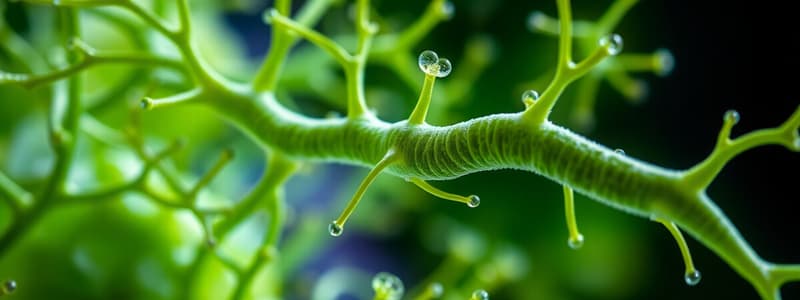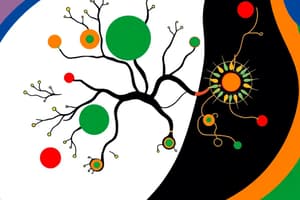Podcast
Questions and Answers
What is the fundamental unit of life in biology?
What is the fundamental unit of life in biology?
The cell is the fundamental unit of life.
Describe the role of genes in inheritance.
Describe the role of genes in inheritance.
Genes carry the instructions for building and maintaining an organism and are passed from one generation to the next.
What is natural selection's role in evolution?
What is natural selection's role in evolution?
Natural selection is a mechanism of evolution where organisms with advantageous traits are more likely to survive and reproduce.
How are molecules related to organelles in cellular biology?
How are molecules related to organelles in cellular biology?
Explain the hierarchical organization of life.
Explain the hierarchical organization of life.
Flashcards
What is Biology?
What is Biology?
The study of life and living organisms, including their structure, function, growth, evolution, distribution, and classification.
What is biological organization?
What is biological organization?
A hierarchical system that starts from the simplest components and progresses to the most complex. The levels are: atoms, molecules, organelles, cells, tissues, organs, organ systems, and organisms.
What is a cell?
What is a cell?
The basic unit of life, capable of independent existence and performing all essential life processes.
What is Genetics?
What is Genetics?
Signup and view all the flashcards
What is Evolution?
What is Evolution?
Signup and view all the flashcards
Study Notes
Introduction to Biology
- Biology is the study of life and living organisms, encompassing their structure, function, growth, evolution, distribution, and taxonomy.
- It's a vast and interdisciplinary field, incorporating concepts from chemistry, physics, and mathematics.
- Biology examines a wide range of topics, from the molecular mechanisms within cells to the interactions of organisms in ecosystems.
Biological Organization
- Life is organized in a hierarchical manner, with increasingly complex levels built upon simpler ones.
- Atoms combine to form molecules, such as water and proteins.
- Molecules assemble into organelles, specialized structures within cells.
- Similar cells form tissues, and tissues combine to form organs.
- Organs contribute to organ systems, which regulate and coordinate the organism's functions.
- Organ systems work together for an organism at the whole organism level.
Cellular Biology
- The cell is the fundamental unit of life.
- All living organisms are composed of one or more cells.
- Cells exhibit remarkable complexity, performing various functions essential to life.
- Cells contain a variety of organelles, with distinct structures and functions. Specific organelles carry out a set of specific tasks.
- Examples include the nucleus (controls cell activities), mitochondria (powerhouse of the cell), and endoplasmic reticulum (protein synthesis).
- Cell membranes control what enters and exits a cell.
Genetics
- Genetics is the study of heredity and the variation of inherited characteristics.
- Genes, segments of DNA, carry the instructions for building and maintaining an organism.
- DNA serves as a blueprint, containing the information for all traits.
- Genes are passed from one generation to the next through reproduction.
- This transmission explains the similarities and diversity among organisms.
- Mutations in genes can lead to variations in traits.
Evolution
- Evolution is the process of change in heritable traits of biological populations over successive generations.
- Populations evolve, not individuals.
- Natural selection is a key mechanism of evolution. Organisms with traits that improve survival and reproduction in their environment are more likely to pass these heritable traits to the next generation.
- This leads to a gradual change in the traits of a population over time.
- Genetic variation is an essential fuel for evolution and adaptation to different environments.
- Evidence for evolution comes from diverse sources including the fossil record, homologous structures, and DNA analysis.
Ecology
- Ecology is the study of the interactions between organisms and their environment.
- Ecosystems encompass various organisms and their physical surroundings.
- Organisms interact in diverse ways, including predation, competition, and symbiosis.
- Energy flows through ecosystems via food chains and food webs.
- Nutrient cycling plays a crucial role in maintaining the health of ecosystems.
- Human activities significantly impact ecosystems worldwide, posing challenges to the conservation of biodiversity.
Microbiology
- Microbiology focuses on microscopic organisms.
- These include bacteria, viruses, fungi, and protists.
- Some microorganisms are beneficial, playing essential roles in ecosystems and human health, while others are pathogenic and cause disease.
- The study of microorganisms includes their growth, structure, function, and interactions with their environment and other organisms.
- There are many areas of microbiology research, including vaccine development, antibiotics, and genetic engineering.
Biochemistry
- Biochemistry explores the chemical processes within and related to living organisms.
- This involves studying various organic molecules (carbohydrates, lipids, proteins, and nucleic acids) and their roles in metabolic processes.
- Metabolism, all the chemical reactions that occur within an organism, is essential for life. Anabolic and catabolic processes are part of this study.
Studying That Suits You
Use AI to generate personalized quizzes and flashcards to suit your learning preferences.




